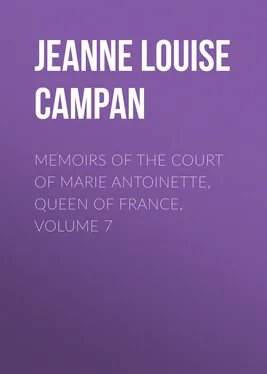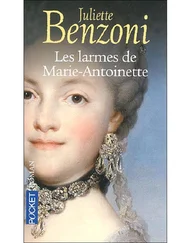Jeanne Louise Henriette Campan - Memoirs of the Court of Marie Antoinette, Queen of France, Volume 7
Здесь есть возможность читать онлайн «Jeanne Louise Henriette Campan - Memoirs of the Court of Marie Antoinette, Queen of France, Volume 7» — ознакомительный отрывок электронной книги совершенно бесплатно, а после прочтения отрывка купить полную версию. В некоторых случаях можно слушать аудио, скачать через торрент в формате fb2 и присутствует краткое содержание. Жанр: Биографии и Мемуары, История, foreign_edu, foreign_antique, foreign_prose, на английском языке. Описание произведения, (предисловие) а так же отзывы посетителей доступны на портале библиотеки ЛибКат.
- Название:Memoirs of the Court of Marie Antoinette, Queen of France, Volume 7
- Автор:
- Жанр:
- Год:неизвестен
- ISBN:нет данных
- Рейтинг книги:3 / 5. Голосов: 1
-
Избранное:Добавить в избранное
- Отзывы:
-
Ваша оценка:
- 60
- 1
- 2
- 3
- 4
- 5
Memoirs of the Court of Marie Antoinette, Queen of France, Volume 7: краткое содержание, описание и аннотация
Предлагаем к чтению аннотацию, описание, краткое содержание или предисловие (зависит от того, что написал сам автор книги «Memoirs of the Court of Marie Antoinette, Queen of France, Volume 7»). Если вы не нашли необходимую информацию о книге — напишите в комментариях, мы постараемся отыскать её.
Memoirs of the Court of Marie Antoinette, Queen of France, Volume 7 — читать онлайн ознакомительный отрывок
Ниже представлен текст книги, разбитый по страницам. Система сохранения места последней прочитанной страницы, позволяет с удобством читать онлайн бесплатно книгу «Memoirs of the Court of Marie Antoinette, Queen of France, Volume 7», без необходимости каждый раз заново искать на чём Вы остановились. Поставьте закладку, и сможете в любой момент перейти на страницу, на которой закончили чтение.
Интервал:
Закладка:
On the 21st September the National Convention was constituted, Petion being made president and Collot d'Herbois moving the "abolition of royalty" amidst transports of applause. That afternoon a municipal officer attended by gendarmes a cheval, and followed by a crowd of people, arrived at the Temple, and, after a flourish of trumpets, proclaimed the establishment of the French Republic. The man, says Clery, "had the voice of a Stentor." The royal family could distinctly hear the announcement of the King's deposition. "Hebert, so well known under the title of Pere Duchesne, and Destournelles were on guard. They were sitting near the door, and turned to the King with meaning smiles. He had a book in his hand, and went on reading without changing countenance. The Queen showed the same firmness. The proclamation finished, the trumpets sounded afresh. I went to the window; the people took me for Louis XVI. and I was overwhelmed with insults."
After the new decree the prisoners were treated with increased harshness. Pens, paper, ink, and pencils were taken from them. The King and Madame Elisabeth gave up all, but the Queen and her daughter each concealed a pencil. "In the beginning of October," says Madame Royale, "after my father had supped, he was told to stop, that he was not to return to his former apartments, and that he was to be separated from his family. At this dreadful sentence the Queen lost her usual courage. We parted from him with abundance of tears, though we expected to see him again in the morning.
[At nine o'clock, says Clery, the King asked to be taken to his family, but the municipal officers replied that they had "no orders for that." Shortly afterwards a boy brought the King some bread and a decanter of lemonade for his breakfast. The King gave half the bread to Clery, saying, "It seems they have forgotten your breakfast; take this, the rest is enough for me." Clery refused, but the King insisted. "I could not contain my tears," he adds; "the King perceived them, and his own fell also."]
They brought in our breakfast separately from his, however. My mother would take nothing. The officers, alarmed at her silent and concentrated sorrow, allowed us to see the King, but at meal-times only, and on condition that we should not speak low, nor in any foreign language, but loud and in 'good French.' We went down, therefore, with the greatest joy to dine with my father. In the evening, when my brother was in bed, my mother and my aunt alternately sat with him or went with me to sup with my father. In the morning, after breakfast, we remained in the King's apartments while Clery dressed our hair, as he was no longer allowed to come to my mother's room, and this arrangement gave us the pleasure of spending a few moments more with my father."
[When the first deputation from the Council of the Commune visited the Temple, and formally inquired whether the King had any complaint to make, he replied, "No; while he was permitted to remain with his family he was happy."]
The royal prisoners had no comfort except their affection for each other. At that time even common necessaries were denied them. Their small stock of linen had been lent them; by persons of the Court during the time they spent at the Feuillans. The Princesses mended their clothes every day, and after the King had gone to bed Madame Elisabeth mended his. "With much trouble," says Clrry, "I procured some fresh linen for them. But the workwomen having marked it with crowned letters, the Princesses were ordered to pick them out." The room in the great tower to which the King had been removed contained only one bed, and no other article of furniture. A chair was brought on which Clery spent the first night; painters were still at work on the room, and the smell of the paint, he says, was almost unbearable. This room was afterwards furnished by collecting from various parts of the Temple a chest of drawers, a small bureau, a few odd chairs, a chimney-glass, and a bed hung with green damask, which had been used by the captain of the guard to the Comte d'Artois. A room for the Queen was being prepared over that of the King, and she implored the workmen to finish it quickly, but it was not ready for her occupation for some time, and when she was allowed to remove to it the Dauphin was taken from her and placed with his father. When their Majesties met again in the great Tower, says Clery, there was little change in the hours fixed for meals, reading, walking and the education of their children. They were not allowed to have mass said in the Temple, and therefore commissioned Clery to get them the breviary in use in the diocese of Paris. Among the books read by the King while in the Tower were Hume's "History of England" (in the original), Tasso, and the "De Imitatione Christi." The jealous suspicions of the municipal officers led to the most absurd investigations; a draught-board was taken to pieces lest the squares should hide treasonable papers; macaroons were broken in half to see that they did not contain letters; peaches were cut open and the stones cracked; and Clery was compelled to drink the essence of soap prepared for shaving the King, under the pretence that it might contain poison.
In November the King and all the family had feverish colds, and Clery had an attack of rheumatic fever. On the first day of his illness he got up and tried to dress his master, but the King, seeing how ill he was, ordered him to lie down, and himself dressed the Dauphin. The little Prince waited on Clery all day, and in the evening the King contrived to approach his bed, and said, in a low voice, "I should like to take care of you myself, but you know how we are watched. Take courage; tomorrow you shall see my doctor." Madame Elisabeth brought the valet cooling draughts, of which she deprived herself; and after Clery was able to get up, the young Prince one night with great difficulty kept awake till eleven o'clock in order to give him a box of lozenges when he went to make the King's bed.
On 7th December a deputation from the Commune brought an order that the royal family should be deprived of "knives, razors, scissors, penknives, and all other cutting instruments." The King gave up a knife, and took from a morocco case a pair of scissors and a penknife; and the officials then searched the room, taking away the little toilet implements of gold and silver, and afterwards removing the Princesses' working materials. Returning to the King's room, they insisted upon seeing what remained in his pocket-case. "Are these toys which I have in my hand also cutting instruments?" asked the King, showing them a cork-screw, a turn-screw, and a steel for lighting. These also were taken from him. Shortly afterwards Madame Elisabeth was mending the King's coat, and, having no scissors, was compelled to break the thread with her teeth.
"What a contrast!" he exclaimed, looking at her tenderly. "You wanted nothing in your pretty house at Montreuil."
"Ah, brother," she answered, "how can I have any regret when I partake your misfortunes?"
The Queen had frequently to take on herself some of the humble duties of a servant. This was especially painful to Louis XVI. when the anniversary of some State festival brought the contrast between past and present with unusual keenness before him.
"Ah, Madame," he once exclaimed, "what an employment for a Queen of France! Could they see that at Vienna! Who would have foreseen that, in uniting your lot to mine, you would have descended so low?"
"And do you esteem as nothing," she replied, "the glory of being the wife of one of the best and most persecuted of men? Are not such misfortunes the noblest honours?"—[Alison's "History of Europe," vol. ii., p. 299.]
Meanwhile the Assembly had decided that the King should be brought to trial. Nearly all parties, except the Girondists, no matter how bitterly opposed to each other, could agree in making him the scapegoat; and the first rumour of the approaching ordeal was conveyed to the Temple by Clery's wife, who, with a friend, had permission occasionally to visit him. "I did not know how to announce this terrible news to the King," he says; "but time was pressing, and he had forbidden my concealing anything from him. In the evening, while undressing him, I gave him an account of all I had learnt, and added that there were only four days to concert some plan of corresponding with the Queen. The arrival of the municipal officer would not allow me to say more. Next morning, when the King rose, I could not get a moment for speaking with him. He went up with his son to breakfast with the Princesses, and I followed. After breakfast he talked long with the Queen, who, by a look full of trouble, made me understand that they were discussing what I had told the King. During the day I found an opportunity of describing to Madame Elisabeth how much it had cost me to augment the King's distresses by informing him of his approaching trial. She reassured me, saying that the King felt this as a mark of attachment on my part, and added, 'That which most troubles him is the fear of being separated from us.' In the evening the King told me how satisfied he was at having had warning that he was to appear before the Convention. 'Continue,' he said, 'to endeavour to find out something as to what they want to do with me. Never fear distressing me. I have agreed with my family not to seem pre-informed, in order not to compromise you.'"
Читать дальшеИнтервал:
Закладка:
Похожие книги на «Memoirs of the Court of Marie Antoinette, Queen of France, Volume 7»
Представляем Вашему вниманию похожие книги на «Memoirs of the Court of Marie Antoinette, Queen of France, Volume 7» списком для выбора. Мы отобрали схожую по названию и смыслу литературу в надежде предоставить читателям больше вариантов отыскать новые, интересные, ещё непрочитанные произведения.
Обсуждение, отзывы о книге «Memoirs of the Court of Marie Antoinette, Queen of France, Volume 7» и просто собственные мнения читателей. Оставьте ваши комментарии, напишите, что Вы думаете о произведении, его смысле или главных героях. Укажите что конкретно понравилось, а что нет, и почему Вы так считаете.












